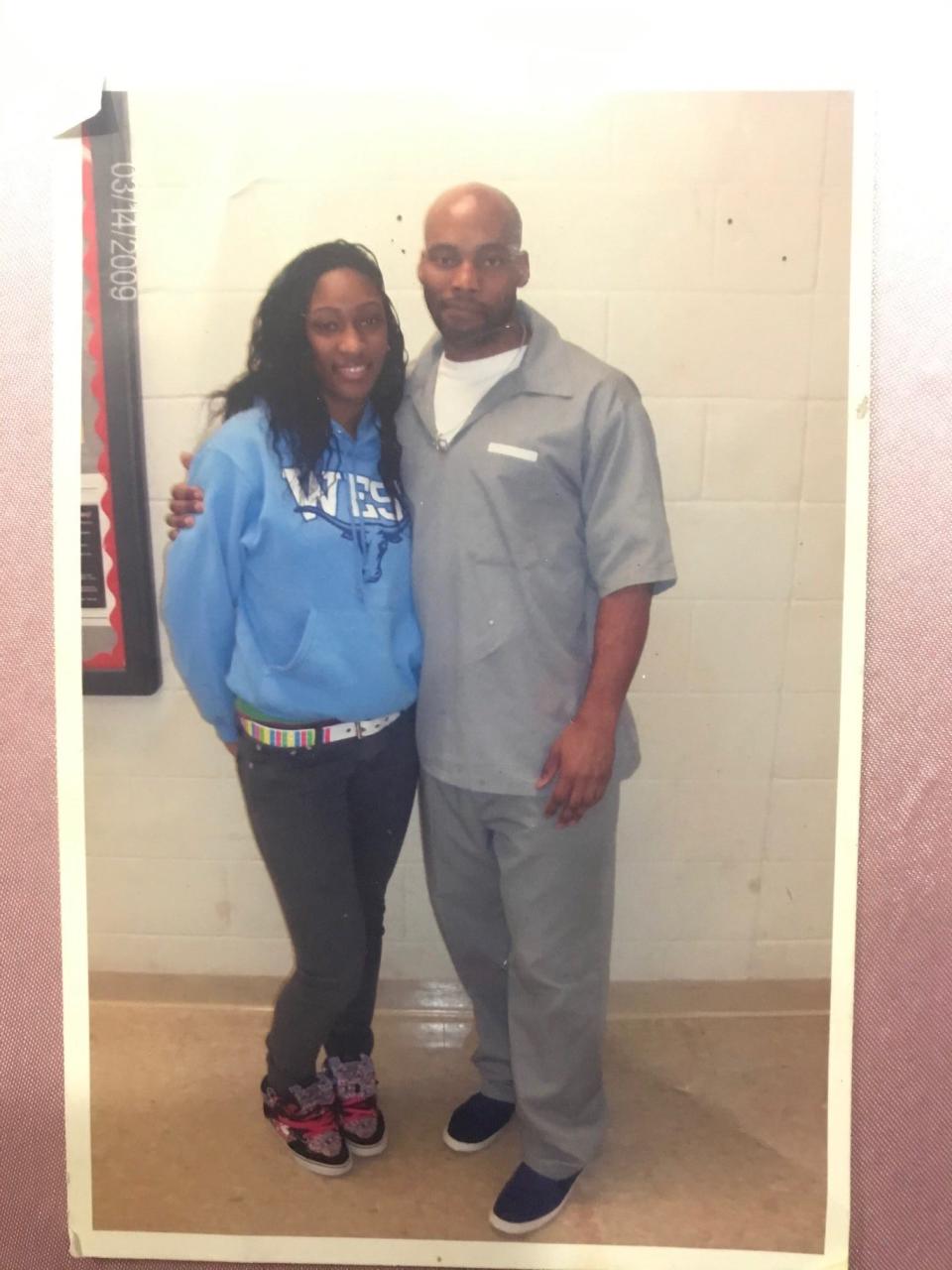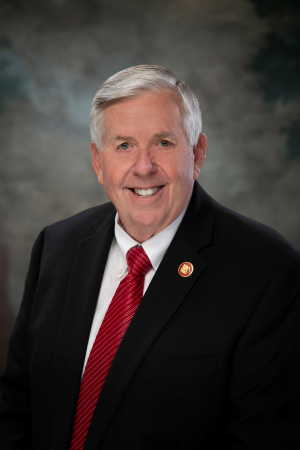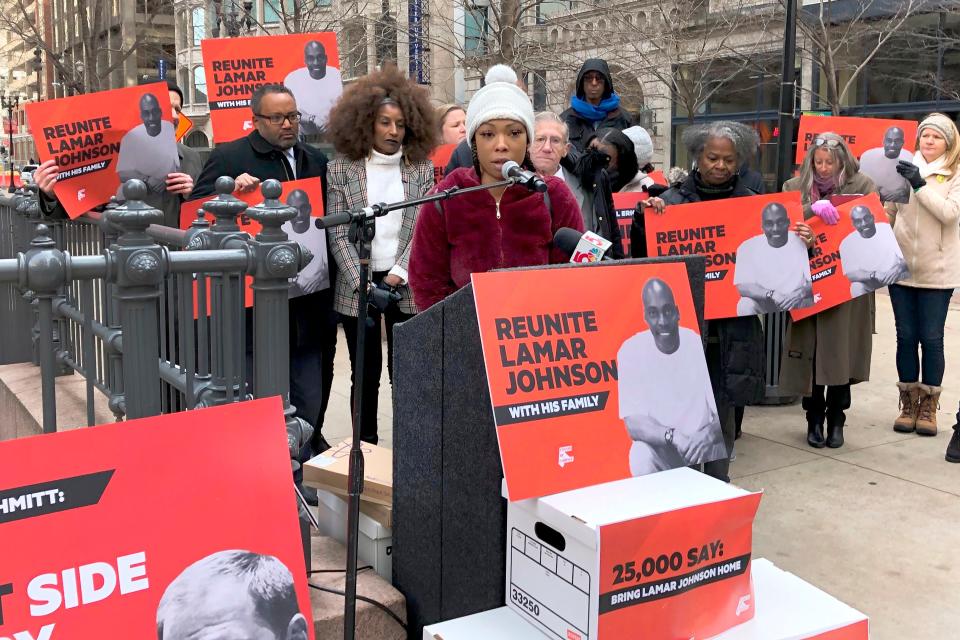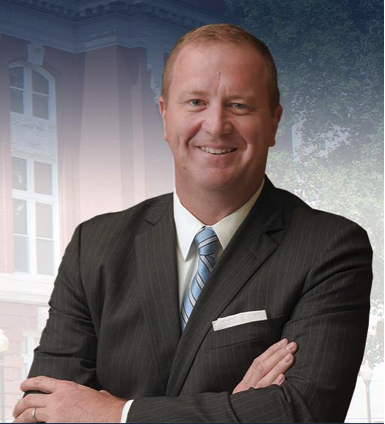These men are serving time for murders Missouri prosecutors say they didn't commit. Why are they still behind bars?
KANSAS CITY, Mo. — The Missouri authorities who convicted an 18-year-old man in a 1978 Kansas City triple murder say they know he's not guilty. And in a 1994 St. Louis murder, local officials have known since at least 2019 that misconduct sent another young man to prison.
Both are innocent, according to local prosecutors. Other people have confessed to the two slayings. But Kevin Strickland, convicted of the 1978 crime, and Lamar Johnson, convicted in 1995, remain in prison.
Two cases on opposite ends of Missouri have this in common: State laws denying local prosecutors the right to vacate convictions have trumped evidence of the men's innocence. The two are also caught up in a politically charged fight pitting a tough-on-crime state attorney general, running for U.S. Senate, against Democratic prosecutors in Kansas City and St. Louis, who admit their offices got the cases wrong.
Republican Missouri Attorney General Eric Schmitt submitted legal filings against both Strickland's and Johnson's release.

His office contends that the lone witness to the killing of which Strickland, now 62, was convicted was forced to recant, before the witness's 2015 death. The attorney general's office also maintains Johnson, now 49, could have walked 3 miles to kill his friend and then walked back to his home in about five minutes.
Officials in Schmitt's office declined to comment on the cases for this article because of ongoing litigation.
Opinion: As COVID rates rise, mandate vaccine for prison staff
Strickland has been in prison for 43 years; Johnson for 26. But Jackson County Prosecutor Jean Peters Baker and St. Louis city attorney Kimberly Gardnerare hoping they can get help in freeing the men from a new Missouri law giving local prosecutors more say in circuit courts to overturn convictions based on a miscarriage of justice.
Schmitt can still intervene in such cases under the law, and he is. But for Baker and Gardner, when the new law takes effect Aug. 28, it will be a new avenue to right past wrongs.
“I don’t know of other attorneys general in other states that have decided to take this kind of position,” said Baker, who says her office wrongly convicted Strickland and has been fighting for his release since May. "I think we stand alone."

Strickland and Johnson are not alone, however, in being convicted of crimes that later evidence found they did not commit.
Since 1989, at least 2,839 people have been exonerated of crimes ranging from sexual assault to murder. Together, those exonerated people spent more than 25,250 years in prison before they were freed.
The most recent high-profile case was this summer, when Curtis Crosland of Philadelphia was released after serving more than 30 years behind bars for murder. Crosland was convicted solely on witness statements that were later recanted.
Samuel Gross, the semi-retired law professor at the University of Michigan who founded the National Registry of Exonerations, estimated the actual number of wrongfully convicted people in the United States to be "at least 100 times greater than the number of exonerations."
'Unconstitutionally cruel treatment': Michigan prisoner seeks release from solitary confinement after 35 years
Missouri 'is an outlier' in its approach to justice
Even with the prosecutors saying Strickland and Johnson are innocent, Missouri Gov. Mike Parson, also a Republican, did not include them on his August pardon list.
"It's pretty easy on the outside to say 'Hey, he's innocent.' I don't know whether he’s innocent or not. I don’t," Parson said when asked about Strickland's case in June by Kansas City's NBC station.
The predicament Strickland and Johnson face is not new in Missouri, which advocates have criticized in investigations and editorials for its particularly strict adherence to statute over facts.
“It is an outlier,” Gross said of Missouri.

In 2003, then-Missouri Attorney General Jay Nixon, a Democrat, had his assistant attorney general, Frank Jung, tell a state Supreme Court justice that case finality outweighed evidence of innocence in the case of Joseph Amrine.
That was a death penalty case involving a 1985 murder of an inmate in which witnesses against Amrine were offered protective custody and reduced charges in exchange for their help to convict Amrine, but later recanted their statements.
Despite the evidence, Nixon and his office pressed to set an execution date. Weighing that case, a justice asked Jung, “Even if we find that Mr. Amrine is actually innocent, he should be executed?”
Jung responded: “That is correct, your honor.”
"Why should people trust a system when even the state itself, the prosecutor, says 'This person is wrongly imprisoned,' and then another part of the state uses the system to block it," said Maurice Possley, senior researcher at the national registry. "That can't be justice. That has to be politics... To me it's criminal in itself."
Baker, the prosecutor in Strickland's case, agrees.

"Maybe everything is political," she said. "Masks have become political, the pandemic is political, but this shouldn't be. We need to push back on that. It's wrong, and sometimes things are wrong — so wrong that they have outcomes that are just too harmful to the practice of prosecution, the seeking of truth and justice."
In Amrine's case, the Missouri Supreme Court ruled 4-3 that there was "clear and convincing evidence of actual innocence that undermines confidence" in Amrine's conviction, and he was freed later that year.
Related story: Drugs that treat opioid addiction and overdoses not widely available in federal prisons
But he was lucky, according to Tricia Rojo Bushnell, executive director of the Midwest Innocence Project.
Years later, in 2016, the Court of Appeals for Missouri's Western District ruled that innocence alone is not grounds for exoneration without some accompanying constitutional violation — or in Amrine's case, a death sentence.
Missouri's Constitution simply wouldn't allow for it.
'Kevin Strickland wasn’t at that house'
Strickland was 18 and a high school dropout who wanted to join the military when he was first tried in 1979. That trial ended with a hung jury, the lone holdout being a woman who voted for an acquittal. She was the panel's only Black member.
A prosecutor at the time allegedly walked to the defense table to warn that the outcome would be different at a retrial. Two months later, Strickland was found guilty, this time by an all-white jury. He was given a life term without the possibility of parole for 50 years.
Cynthia Douglas, then 20, was the only witness who picked out Strickland as one of the four assailants after her sister's boyfriend suggested he could have been the young, short man who waved a shotgun at the scene where three people — two men and a woman, all in their 20s — were killed.
Douglas, who was injured in the shooting, sat in the very back of the courtroom that year when Vincent Bell and Kilm Adkins pleaded guilty to the killings that April night in a Kansas City bungalow.
In his plea, Bell said: "I’m telling you the truth. Kevin Strickland wasn’t at that house."
Strickland did have an alibi for the night of April 25, 1978, according to Baker's office. He was home with his brother, chatting on the phone with his girlfriend and watching television.
Soon after the Bell guilty plea, Douglas began having doubts about her memory of that night, and she began telling anyone and everyone, including prosecutors, that she was mistaken, according to Baker.
She knew her testimony was the single piece of evidence that sent Strickland to prison. Without it, there is no case against him, Baker said.
In February of 2009, Douglas, then Cynthia Richardson and working for the county’s Family Court Services’ accounting department, wrote to the Midwest Innocence Project.
Her short email carried the subject line “Wrongfully charged,” and it read: “I am seeking info on how to help someone that was wrongfully accused, this incident happened back in 1978, I was the only eyewitness and things were not clear back then, but now I know more and would like to help this person if I can.”
The Innocence Project, founded in 2001, estimates “there are roughly 2,000-7,000 people in Arkansas, Iowa, Kansas, Missouri, and Nebraska that are locked behind bars this very moment for crimes they did not commit.”
It is a lot of cases, and Strickland’s wasn’t taken up by the organization until 2018, according to Bushnell, who started at the Innocence Project in 2013.

Since then, Strickland's attorneys — backed by Baker, Jackson County's presiding judge, federal prosecutors, the city's mayor and the attorneys who originally won Strickland's conviction — took his case to the Missouri Supreme Court.
The state's high court declined to hear the case in June.
Bushnell and her team refiled the case in DeKalb County, Missouri, where he is locked up at Western Missouri Correctional Center.
An evidentiary hearing is scheduled for November. Baker could file a motion to exonerate Strickland in Kansas City once the new law takes effect Aug. 28, she said. In the meantime, other discovery filings are being made in DeKalb.
Other people have confessed to the killing that put Johnson in prison
The men who killed Marcus Boyd on Oct. 30, 1994, were wearing black masks with nothing showing except their eyes.
Despite that, police and prosecutors relied on a witnesses identification to bring charges against Johnson.
According to police and prosecutors at the time, Johnson, a known narcotics dealer, walked to Boyd’s house 3 miles away, angry over their drug arrangement. His face covered in a ski mask, Johnson and another masked man fatally shot Boyd, authorities said at the time.
Boyd was on his stoop with his friend, Gary Elking, while Boyd’s girlfriend was upstairs. No one — neither Elking nor Boyd’s girlfriend — could make out the killers' identities.
But the friend was interviewed by police and, despite insisting he couldn’t see the faces of the assailants, picked Johnson out of a lineup. Investigators then relied on a jailhouse informant who claimed Johnson admitted to the murder while awaiting trial.

Johnson was convicted in 1995 and given life without parole.
But the case was built on a fabrication, according to Gardner, a prosecutor reelected in St. Louis last year with 74% of the vote.
In 2018, the same year that the Innocence Project took up Strickland’s case, Gardner assigned her Conviction Integrity Unit to Johnson's case.
What the unit discovered was rampant corruption surrounding the initial investigation and prosecution.
An eyewitness was paid thousands of dollars by investigators to pin the killing on Johnson (the witness later recanted); prosecutors withheld key evidence, including parts of the criminal history of the jailhouse informant; and two other men confessed to the murder, the Integrity Unit found.

When Gardner, the circuit attorney for the city of St. Louis, discovered the fabrication of evidence, the payoffs and other corruption, she filed for a new trial in 2019. The request was quickly dismissed.
There was no law in Missouri allowing local prosecuting attorneys to correct wrongful convictions. The state Attorney General’s Office has opposed every case of potentially wrong convictions presented to the office since at least 2000, Bushnell said. There have been some 200 cases over that time period, according to a report from the Injustice Watch.
The next stop, much like in Strickland's case, was the state Supreme Court. In March, the court decided the law didn't allow Johnson's case to be heard.
Since then, there have been a series of discovery filings. In one of the AG's responses in the Cole County Circuit Court, the office wrote on Aug. 6: “Johnson’s evidence of innocence is not compelling. It has been presented to, and rejected by, multiple courts. The additional affidavits that Johnson provides this Court to support his claim of innocence are so factually inconsistent that they destroy any credibility his claim of innocence might otherwise have.”
One of the people who confessed to killing Boyd, James Howard, is in prison for a separate killing.
Howard attested in 2002, 2005 and 2009 that Johnson was not there during the October 1994 murder. Despite Howard's sworn statement to investigators that he and Phillip Campbell killed Boyd after a botched robbery attempt over a drug dispute, Howard has never been charged in Boyd's death.
Campbell wrote to Johnson in prison in 1995 and signed two sworn statements in 1996 and 2009 saying Johnson had nothing to do with Boyd's slaying. And while Johnson is in prison for the murder under a sentence of life without the possibility of parole, Campbell got seven years — serving six — before dying in 2019.
Gardner, too, plans to file a motion to exonerate Johnson when the new law takes effect this month.
Growth of a new system for prosecutors to check the integrity of convictions
In both the Strickland and Johnson cases, prosecutors relied on conviction integrity units — relatively new annexes of prosecutors' offices across the United States.
The offices are assigned to investigate — or prevent — any potential wrongdoing in criminal cases where claims of wrongful conviction are made and there's evidence they're true. If evidence is found, local prosecutors usually move to vacate a sentence and exonerate the convicted.

According to the National Registry of Exonerations, there are about 90 such units in the country, most of them at the county level, with a few statewide units. About 40 have recorded exonerations, according to the registry. Most have started in the last 10 years, Gross said.
The first, begun in 2002, is in Santa Clara County, California. It has recorded six exonerations, and was started around the same time that Illinois' governor, George Ryan, abolished the death penalty in that state because of police and prosecutorial misconduct.
There are more than a dozen such units in the Midwest, including in Kansas, Missouri, Indiana, Illinois and Ohio.
The units' establishment “is basically using the power of the state to reinvestigate cases where there's serious evidence that some person was (wrongfully) convicted. And then, when they conclude that that has happened, making sure that that person is released," Gross said.
“It is finally a breath of fresh air in a very depressing context for prosecutors to start using their authority to deal with cases like Mr. Johnson and Mr. Strickland,” Gross said.
But the units won’t solve all the ills that complicate America’s “weird, complicated, fragmented system” of justice, Gross said.
Nearly all local prosecutors, local judges, state prosecutors, state judges and state supreme court justices are elected officials answering to their own constituencies. That creates a system, he said, where agencies are not on the same page with budgets and organizational structure or on political goals.
“It’s just nutty,” he said.
Bushnell agrees.
"I just think it's hard for any of us to understand how there can be any system that lets people languish," she said. "There's no question that they're both innocent ... and yet the question is why are they still sitting there, right? You always hear people say that people get out (of prison) on technicalities, but technicalities — they're actually what keep innocent people in."
Follow Eric Ferkenhoff on Twitter: @ericferk.
This article originally appeared on USA TODAY NETWORK: Missouri prisoners convicted of murder are innocent, prosecutors say

